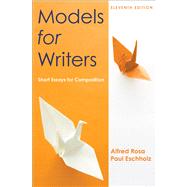
Models for Writers Short Essays for Composition
by Rosa, Alfred; Eschholz, PaulBuy Used
Rent Textbook
New Textbook
We're Sorry
Sold Out
eTextbook
We're Sorry
Not Available
How Marketplace Works:
- This item is offered by an independent seller and not shipped from our warehouse
- Item details like edition and cover design may differ from our description; see seller's comments before ordering.
- Sellers much confirm and ship within two business days; otherwise, the order will be cancelled and refunded.
- Marketplace purchases cannot be returned to eCampus.com. Contact the seller directly for inquiries; if no response within two days, contact customer service.
- Additional shipping costs apply to Marketplace purchases. Review shipping costs at checkout.
Summary
Author Biography
Table of Contents
1 The Writing Process
Prewriting
Writing the First Draft
Revising
Editing
Proofreading
Writing an Expository Essay: A Student Essay in Progress
Jeffrey Olesky, “Golf: A Character Builder”
Getting the Most Out of Your Reading
Rachel Carson, “Fable for Tomorrow”
Using Your Reading in the Writing Process
Writing from Reading: Four Sample Student Essays
* A Narrative Essay: Trena Isley, “On the Sidelines” (student essay)
A Response Essay: Zoe Ockenga, “The Excuse ‘Not To’” (student essay)
* A Reflective Essay: Jennifer Chu, “A Bowl of Noodles” (student essay)
* An Argumentative Essay: James Duffy, “One Dying Wish” (student essay)
Note: Readings in Chapters 3-22 follow the same structure as listed here for Helen Keller, “The Most Important Day.” For brevity, the apparatus subheadings are not repeated.
Helen Keller, “The Most Important Day”
Reflecting on What You Know
Thinking Critically about This Reading
Questions for Study and Discussion
Classroom Activity Using Thesis
Suggested Writing Assignments
Thomas L. Friedman, “My Favorite Teacher”
Sandra Cisneros, “My Name”
Gloria Naylor, The Meanings of a Word
Cherokee Paul McDonald, “A View from the Bridge”
Audrey Schulman, “Fahrenheit 59: What a Child’s Fever Might Tell Us about Climate
Change”
* Sean Prentiss, “Buying a House”
Michael T. Kaufman, “Of My Friend Hector and My Achilles Heel”
Richard Lederer, “The Case for Short Words”
Carl T. Rowan, “Unforgettable Miss Bessie”
William Zinsser, “Simplicity”
Mike Rose, “I Just Wanna Be Average”
* Tobias Wolff, “The Last Shot”
David Raymond, “On Being 17, Bright, and Unable to Read”
Russell Baker, “Becoming a Writer”
Nancy Gibbs, “The Magic of the Family Meal”
Alice Walker, “Childhood”
Langston Hughes, “Salvation”
* Judith Ortiz Cofer, “Volar”
Sharon Begley, “Praise the Humble Dung Beetle”
Jake Jamieson, “The English-Only Movement: Can America Proscribe Language with a Clear Conscience?”
* Terry Tempest Williams, “The Clan of One-Breasted Women”
Dick Gregory, “Shame”
David Sedaris, “Me Talk Pretty One Day”
* Tina McElroy Ansa, “The Center of the Universe”
* Brian Doyle, “Irreconcilable Dissonance”
Robert Ramirez, “The Barrio”
Anne Lamott, “Polaroids”
* Benjamin Percy, Invasion
13 Illustration
Barbara Huttmann, “A Crime of Compassion”
Gregory Pence, “Let’s Think Outside the Box of Bad Clichés”
* Verlyn Klinkenborg, “Our Vanishing Night”
Steven Pinker, “In Defense of Dangerous Ideas”
Henry Louis Gates Jr., “What’s in a Name?”
* Erin Murphy, “White Lies”
Maya Angelou, “Momma, the Dentist, and Me
Kate Chopin, The Story of an Hour
Eudora Welty, “The Corner Store”
* Joanne Lipman, “And the Orchestra Played On”
* Kyoko Mori, “Yarn”
* Salman Rushdie, “The Taj Majal”
Paul Merrill, “The Principles of Poor Writing”
* Nicholson Baker, “How to Make Chocolate Sauce”
* Diane Ackerman, “Why Leaves Turn Color”
Lawrence M. Friedman, “What Is Crime?”
Ellen Goodman, “The Company Man”
* Eduardo Porter, “What Happiness Is”
Martin Luther King Jr., “The Ways of Meeting Oppression”
* Marion Winik, “What Are Friends For?”
William Lutz, “Doubts about Doublespeak”
Mark Twain, “Two Ways of Seeing a River”
* Suzanne Britt, “That Lean and Hungry Look”
Bharati Mukherjee, “Two Ways to Belong in America”
* Amanda Ripley, “Who Says a Woman Can’t Be Einstein?”
* Gita Mehta, “The Famine of Bengal”
Stephen King, “Why We Crave Horror Movies”
Myriam Marquez, “Why and When We Speak Spanish in Public”
Sanjay Gupta, “Stuck on the Couch”
Thomas Jefferson, “The Declaration of Independence”
Martin Luther King Jr., “I Have a Dream”
* Dave Zirin, “What Pro Sports Owners Owe Us”
Mary Sherry, “In Praise of the F Word”
Crime: What Constitutes an Effective Punishment?
June Tangney, “Condemn the Crime, Not the Person”
Dan M. Kahan, “Shame Is Worth a Try”
* Carl M. Cannon, “Petty Crime, Outrageous Punishment”
Advertising: How Does It Affect Our Lives?
* Allen D. Kanner, “The Piracy of Privacy”
* Terry O’Reilly, “Marketing Ate Our Culture–But It Doesn’t Have To”
* Ruth La Ferla, “Generation E.A.: Ethnically Ambiguous”
Critical Thinking: Advertisements for Analysis
* Hugh Rank, “Intensify/Downplay”
Torture: Are We For or Against It?
* Charles Krauthammer, “The Truth about Torture”
* Andrew Sullivan, “The Abolition of Torture”
An Annotated Student Research Paper: Cori Schmidtbauer, “To Facebook or Not” (student essay)
An electronic version of this book is available through VitalSource.
This book is viewable on PC, Mac, iPhone, iPad, iPod Touch, and most smartphones.
By purchasing, you will be able to view this book online, as well as download it, for the chosen number of days.
Digital License
You are licensing a digital product for a set duration. Durations are set forth in the product description, with "Lifetime" typically meaning five (5) years of online access and permanent download to a supported device. All licenses are non-transferable.
More details can be found here.
A downloadable version of this book is available through the eCampus Reader or compatible Adobe readers.
Applications are available on iOS, Android, PC, Mac, and Windows Mobile platforms.
Please view the compatibility matrix prior to purchase.
